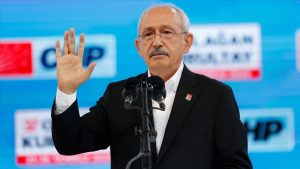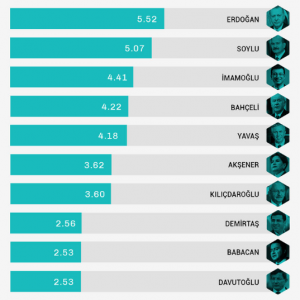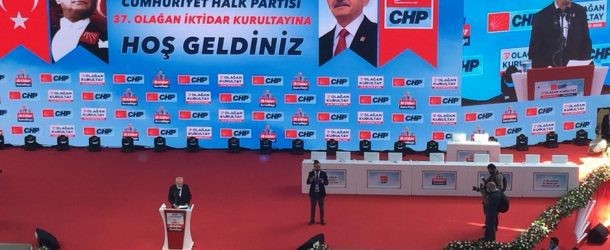Introduction
Turkey’s main opposition party, pro-European Union and social democratic CHP (Republican People’s Party) organized its 37th congress last week-end in Ankara. While the party’s current and the 7th Chair[1] –since 2010– Kemal Kılıçdaroğlu (71) was easily elected once again as the only eligible candidate for the leadership contest (three other candidates Professor Tolga Yarman, İlhan Cihaner, and Aytuğ Atıcı could not become candidate due to insufficient number of signatures by delegates), the party adopted a new manifesto for the future entitled “Manifesto for the Call to the Second Century” (İkinci Yüzyıla Çağrı Beyannamesi). In this piece, I am going to summarize the most important developments concerning CHP’S 37th Congress and try to assess the party’s chance to become Turkey’s ruling party.
Analysis
The first thing to be said about CHP’s 37th Congress is that, the Congress reaffirmed Kemal Kılıçdaroğlu’s power and one-man position within the party. While CHP supporters often criticize Turkey’s ruling AK Parti (Justice and Development Party) for their lack of intraparty democracy and Congresses and leadership elections with only one candidate (that is naturally Turkish President Recep Tayyip Erdoğan), CHP also followed the same path during its 37th Congress. However, this might be considered as an advantage in some ways in a country like Turkey; since the party in a sense showed solidarity with this Congress and Turkish people often support strong leaders due to cultural and historical reasons.
The second important and interesting thing about the Congress is that three important people serving as Kılıçdaroğlu’s Deputy Chairs before, Ünal Çeviköz, Yıldırım Kaya, and Tuncay Özkan could not get elected to the Party Assembly by the votes of the delegates. Another Deputy Chair Aykut Erdoğdu also could not get elected due to gender quota (minimum 33 % representation for each gender) implemented by the party.[2] This means that 4 of Kılıçdaroğlu’s candidates were not elected. Especially the party’s fresh blood Yunus Emre and Elazığ representative Gürsel Erol’s performance in the election was striking. This shows that although CHP delegates support Kılıçdaroğlu’s leadership, they also want to see their own supported Deputy Chairs around him.

Kemal Kılıçdaroğlu became CHP’s longest serving Chair after İnönü, Baykal, and Atatürk
Third important thing about the Congress was the newly declared “Manifesto for the Call to the Second Century” (İkinci Yüzyıla Çağrı Beyannamesi). Manifesto consisted of these 13 points:[3]
- A new democratic constitution will be adopted for transition into a strengthened parliamentary regime.
- Social peace will be provided with the appropriate solution to Kurdish Problem, the attainment of male-female equality, and the struggle against terrorist and criminal organizations.
- Meritocracy will be implemented in state affairs.
- The Electoral Law (Seçim Yasası) will be changed in order to make people able to choose their own supported candidates. Gender quota will be made compulsory for all political parties.
- Political Ethics Law (Siyasi Ahlak Yasası) will be legislated in order to fight with corruption.
- Public Procurement Law (Kamu İhale Kanunu) will be regulated in order increase competition and transparency.
- Turkish Court of Accounts (Sayıştay) will be empowered and National Tax Council (Ulusal Vergi Konseyi) and Final Account Commission (Kesin Hesap Komisyonu) within the Turkish Grand National Assembly (TBMM) will be established.
- Strategic Planning Agency (Stratejik Planlama Teşkilatı) will be established in order to plan and organize strategic steps of the state.
- Education system will be reorganized. The aim of the education will be to raise democratic generations. For realizing this, Turkish Higher Board of Education (YÖK) will be abolished.
- Ecosystem Right (Ekosistem Hakkı) will be preserved for future generations. In doing this, “sustainable development” will be made a constitutional principle.
- Insurance for Family Support system (Aile Destek Sigortası) will be established to provide each family a basic income.
- A new balance will be established between the center (Ankara) and local authorities in order to increase efficiency in state affairs.
- Middle East Peace and Cooperation Organization (Ortadoğu Barış ve İşbirliği Teşkilatı) will be founded by Turkey’s initiative with the participation of Syria, Iraq, and Islamic Republic of Iran.
Comments
If we have to assess CHP’s latest Congress, the first thing to be said is that while the party’s newly declared “Manifesto for the Call to the Second Century” (İkinci Yüzyıla Çağrı Beyannamesi) is a good-intentioned initiative that contains important political goals, there is still lack of concrete projects and plans especially about the party’s Kurdish policy, economic policy, and foreign policy. While a phrase like “solving the Kurdish problem” is a good populist rhetoric to attain Kurdish voters, the important is to declare and explain in details the methods and policies that will be used by the party. Likewise, the party’s economic and foreign policy also seems rhetorical rather than political. For instance, although the idea of Middle East Peace and Cooperation Organization seems very interesting, the party seems to forget the very reasons why AK Parti government had to come to its current positioning while it was previously advocating “zero problems with neighbors” (komşularla sıfır sorun) policy.

Support for presidential and parliamentary regime in Turkey (July 2020)
However, CHP seems quite strong and consistent in terms of its insistence on parliamentary regime. Recent polls published by Türkiye Raporu (Turkey Report) website (prepared by Istanbul Economics & Research/İstanbul Ekonomi Araştırma company) show that only 38.8 % of Turkish people support the current presidential system, while the 22.7 % of people want to return to old parliamentary system, and another 38.4 % of people prefer a new strengthened parliamentary model.[4] This shows that the party could mobilize 60-61 % of people on the basis of a system-based discussion before the next presidential election. However, I have doubts concerning this policy since many of the people do not exactly know the details and differences between the parliamentary and the presidential system. Thus, an academic and notional discussion about the system could be repellent for ordinary people who suffer from more serious problems such as unemployment, inflation, authoritarianism etc. Rather, the party could challenge the current one-man regime without getting into a political science based system discussions.
Most recent polls show that, although the party was able to win in three biggest cities of Turkey (Istanbul, Ankara, and Izmir) in March 2019 local elections, the current support for the party was only around 18.6 % while the governing AK Parti has still considerable (36.3 %) support.[5] There are still 10-11 % indecisive voters, which could increase CHP’s votes in a presidential election to 23-24 % according to my estimations. Moreover, the pro-secular nationalist Good Party (İYİ Parti) has 9.2 %, pro-Kurdish Peoples’ Democratic Party (HDP) has 10.4 %, Ali Babacan’s newly established Democracy and Leap Party (DEVA Partisi) has 2.4 %, and Ahmet Davutoğlu’s newly established Future Party (Gelecek Partisi) has 0.8 % support. This means that, a CHP-led presidential candidate that could appeal to secular nationalists, Kurds, and Erdoğan opponent conservative voters could get 45-46 % of the votes. On the other hand, AK Parti and President Erdoğan still seem advantageous due to 9.5 % Nationalist Action Party (MHP) votes in addition to 1 % Felicity Party (Saadet Partisi) support. This means President Erdoğan could easily reach 47 % of the votes. Moreover, Erdoğan’s popular Hagia Sophia (Ayasofya) policy could attract more voters in the following days. Thus, CHP needs a presidential candidate that would unify all major political inclinations in the country (social democracy/Kemalism, conservatives, secular nationalists, and Kurds) at the next presidential election.

Most popular politicians in Turkey (July 2020)
From my perspective, the ideal candidate is Ekrem İmamoğlu, the new municipal leader of Istanbul. İmamoğlu is the third most popular politician in Turkey after Erdoğan and Süleyman Soylu according to Türkiye Raporu (Turkey Report).[6] Mansur Yavaş, the municipal leader of Ankara could also be a good presidential candidate although he risks losing Kurdish votes due to his ultranationalist background. Yavaş is placed as the fifth most popular politician following Erdoğan, Soylu, İmamoğlu, and Devlet Bahçeli. Another important factor to be mentioned here is the importance of the position of Deputy President (Cumhurbaşkanı Yardımcısı) in the new system, currently Fuat Oktay. Considering this, Kılıçdaroğlu could become a presidential candidate himself and declare İmamoğlu, Yavaş, or Good Party leader Meral Akşener as his Deputy President in order to unify all oppositional parties. In any case, there will be serious political discussions and negotiations both within the government and opposition circles before the next presidential election.

Mansur Yavaş or Ekrem İmamoğlu could be CHP’s next presidential candidate
Conclusion
To sum up, CHP’s 37th Congress was successful in creating a bit of political excitement, but it was not enough to convince people that a historical governmental change is about to happen soon in the next presidential election. The reason for this is President Erdoğan’s diabolical political mind; Erdoğan was able to attract all media attention both in Turkey and outside with the Hagia Sophia move and somehow overshadowed the CHP congress. Another thing to be questioned here is why the CHP is not reaching higher percentage of votes although many people in Turkey are very unhappy about the current political and economic situation of their country. This shows that, due to religious prejudices against secularism and CHP’s Alevi (a religious minority group in Turkey) electorate, as well as the successful populist right-wing politics in Turkey, the party still could not embrace at least the half of Turkish society. It is also very strange to note that CHP’s Scientific Committee (Bilim Kurulu) could not devise and implement any concrete policy to overcome this difficulty.
Assoc. Prof. Dr. Ozan ÖRMECİ
[1] CHP’s earlier Chairs are as follows: Mustafa Kemal Atatürk (1923-1938), İsmet İnönü (1938-1972), Bülent Ecevit (1972-1980), Deniz Baykal (1992-1995, 1995-1999, 2000-2010), Hikmet Çetin (1995-1995), and Altan Öymen (1999-2000).
[2] https://www.sozcu.com.tr/2020/gundem/chpde-kurultay-tamamlandi-yeni-parti-meclisi-belli-oldu-5954743/.
[3] https://www.gazeteruzgarli.com/chp-kurultayinin-sonuc-bildirgesi-kabul-edildi/.
[4] https://www.turkiyeraporu.com/turkiyenin-mevcut-yonetim-sistemine-kamuoyunun-bakisi.

























































